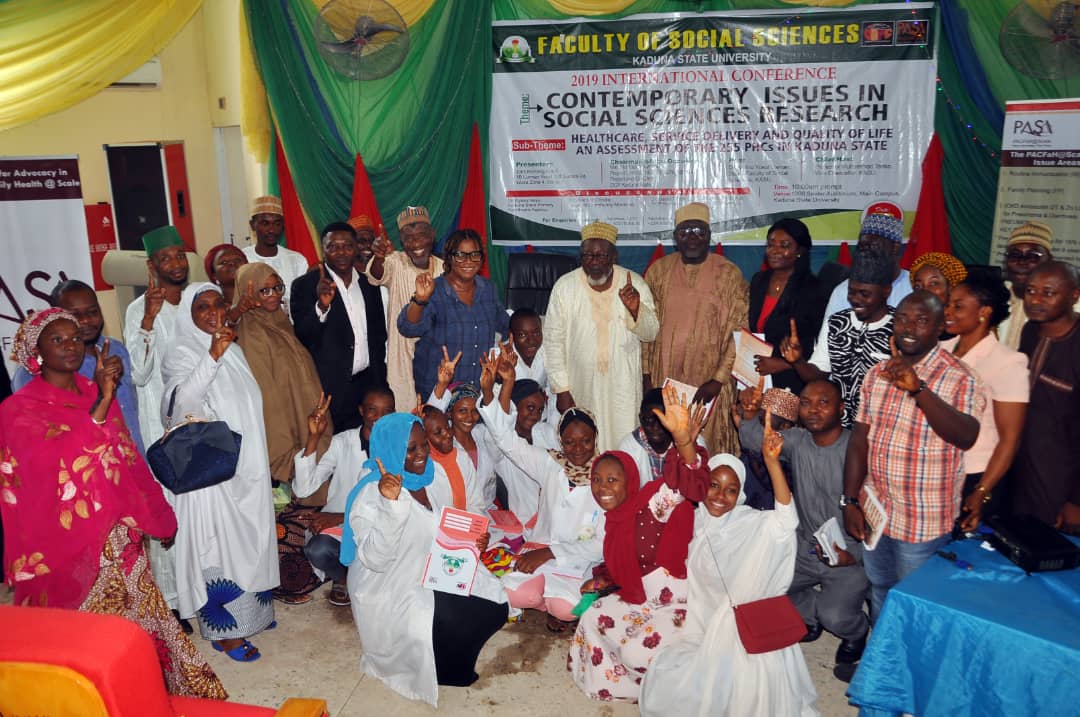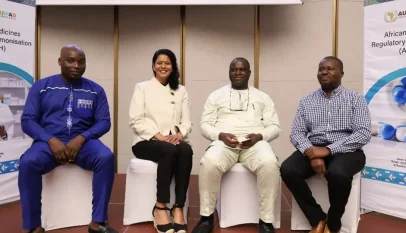Experts, CSOs set agenda for El-Rufa’I towards attaining Universal Health Coverage in Kaduna
Health experts and civil society organizations working under the Partnership for Advocacy in Child and Family Health at Scale (PACFaH@Scale) in collaboration with the Kaduna State University (KASU) and the Open Government Partnership (OGP) in Kaduna, have asked Governor Nasir Ahmed El-Rufa’i to prioritize the full implementation of the Primary Health Care Under One Roof (PHCUOR) policy as the surest path towards the attainment of Universal Health Coverage (UHC) in the state.

The experts and civil society organizations made the call during the 2019 international conference on contemporary issues in social science research at the Kaduna State University (KASU) on Tuesday.
The lead presenter, who is also the Project Director for IIGES-PACFaH@Scale project in Kaduna state, Mustapha Jumare, while presenting findings from a recent assessment exercise conducted across 255 model Primary Healthcare Centres (PHCs) currently under renovation in Kaduna State, said both the ongoing renovation of the 255 PHCs and review of Kaduna’s 2019 health budget, showed significant non-compliance to policy requirements necessary for the attainment of universal health coverage in the state.
Jumare said lack of timely release of budgetary allocation and failure of the state primary healthcare agency to ensure implementation of Primary Health Care Under One Roof (PHCUOR) policy at state and sub-state levels was posing a serious challenge to healthcare delivery in the state. He identified the major challenges as lack of adequate and qualified PHC workers – hence the inability of the primary health care centers in the state to offer 24-hour service – as the major drawbacks to achieving quality and universal healthcare delivery in the state.
“Kaduna state government in 2019 budgeted the sum of NGN2,462,570,274 for the renovation/upgrading and construction of primary health care centers (PHCs) in the state; NGN15,985,600 for furnishings of three zonal cold stores at Zaria, Kaduna and Kafanchan and NGN550,000,000 as counterpart funding. From January till date, the state government has not released any funds,’’ he said.
Jumare added that although the Kaduna state government had in 2019 budgeted the sum of NGN 4, 907,386,915 as total allocation for the state primary health care agency and has so far released the sum of NGN 16,757,642 for only recurrent expenditure, which represents only 8% of the total allocation, this amount is grossly inadequate to fund the activities of the State Primary Health Care Development Agency (SPHCDA).
“Issues bordering on key requirements for PHCUOR implementation at state and sub state levels are not captured in the SPHCDA law, Malaria, HIV/AIDS and TBL programs were not captured in the law establishing the SPHCDA. The spot check assessment revealed that most primary health centers (PHCs) are not operating 24 hour services and only 48% of the PHC assessed operate 24hour services,” according to Jumare.
Our findings at the 255 prioritized PHCs also revealed a shortage of personnel working at the PHCs. For example, out of the 255 assessed PHCs, only 130 (53%) PHCs have a medical doctor or Community Health Officer (CHO) providing services. About 18 (7%) PHCs have the recommended four nurse/midwives while 170 (70%) PHCs have at least three Community Health Extension Workers (CHEWs). Also, 143 (59%) have at least one laboratory technician whilst 23 (9%) PHCs have six Junior Community Health Extension Workers (JCHEWs) with 122 (50%) of the PHCs having one Environmental Health Officer (EHO) each.
Only 159 of the PHCs assessed have at least two health attendants. A total of 18 (7%) of the primary health centers (PHCs) assessed have pharmacy technicians. Despite the importance of having adequate security in protecting lives and property at PHCs, only 10 (4%) of the assessed PHCs have at least two security personnel. In addition, only 5 (2%) of the PHCs have general maintenance staff. Our findings further showed 65% of the PHCs renovated/upgraded in Kaduna state were yet to begin operations while 35% of the PHCs assessed were still in a dilapidated condition.
While speaking at the event, Dr James Akpokos of the department of sociology at Kaduna State University, (KASU) charged the state government to invest in the health sector as a panacea to the on-going socio-economic challenges facing the state. He said with adequate funding for the health sector, the state will be in the best position to deliver the needed dividends of democracy.
In his response, The Executive Secretary of the Kaduna State Primary Health Care Development Agency, Dr Hamza Abubakar, represented by a director at the Agency disclosed that Kaduna state was yet to receive its operational cost of the BHCPF from the National Primary Health Care Development Agency, despite having already made payment of its counterpart funds to the tune of one hundred million to the federal government.
He however assured that Kaduna state government was prioritizing funding for the health sector in view of the significance of health to the socio economic development of the state. “No nation develops without healthy citizens which is why the state government is fulfilling all its commitments in the areas of funding, policy implementation and infrastructural development,’’ he added
Highlight of the occasion was the decision of the experts and CSOs to continue to collaborate with the state government to ensure an effective primary health care delivery system as the easiest route towards attaining Universal Health Coverage (UHC).












